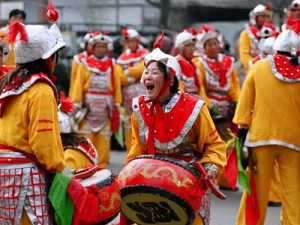By Ruiling Feng
Chinese Language Intern
 Some people call it Chinese New Year; some people call it Lunar New Year and some people call it Spring Festival “春节”. The first one is never my favorite way, as this festival is celebrated by several other countries, too; the second one is merely an explanation of what it is; the third one is the most touching one for me, because it is more beautiful, more commonly used to describe this festival and more related to my life in China. If asked how important it is to Chinese people, I’d like to take myself as an example. This is my first time in my whole life that I didn’t celebrate it with my family.
Some people call it Chinese New Year; some people call it Lunar New Year and some people call it Spring Festival “春节”. The first one is never my favorite way, as this festival is celebrated by several other countries, too; the second one is merely an explanation of what it is; the third one is the most touching one for me, because it is more beautiful, more commonly used to describe this festival and more related to my life in China. If asked how important it is to Chinese people, I’d like to take myself as an example. This is my first time in my whole life that I didn’t celebrate it with my family.
In China, both Solar Calendar and Lunar Calendar are widely used, but the latter is mainly popular for farmers. Although Spring Festival, more specifically speaking, refers to the first day of the lunar new year, the real celebration begins from the last day of the old year and lasts to the Lantern Festival which falls on the 15th day of the first month of Lunar Calendar. Unfortunately, most people in cities have to say goodbye to the holiday and begin to work around the 6th of the first month.
I have been asked many times what the most common custom for the celebration is. Apparently, eating is absolutely one of the right answers. Family reunion dinner, party with friends, visiting relatives, etc., all center around eating and talking. Every year, when the Spring Festival is coming, my parents will prepare a lot of vegetables, meat, drinks, snacks, while waiting for their children to come back. However, people in different regions may prepare different food. Dumplings are well-known worldwide, which doesn’t need further details. Many people are confused why Chinese people like connecting fish with the Spring Festival. There is actually an interesting custom about it. The Chinese idiom 年年有余 “Nian Nian You Yu” can vividly reflect this tradition. The pronunciation of “余” (surplus) is the same with that of “鱼” (fish), so the fish for the New Year Eve family reunion dinner will not be finished completely, leaving some for next year, indicating the wish “May every year ends with ample surplus”.
There are some popular decorations for Spring Festival, for example, couplets, paper-cut and New Year painting, kumquat trees, red lantern, upside down ‘Good Fortune’ signs. Speaking of kumquat trees, although it is basically more popular in Cantonese, there is an amazing story happening between Brother Orange, a Chinese man, and Matt Stopera, an American, there this year. Matt is probably the most well-known foreigner for Chinese citizens during this Spring Festival celebration. The story is about Matt’s lost IPhone that was bought by Chinese man who took some selfies, and Matt accidentally saw these photos on his new IPhone probably because they share one iCloud account. Anyway, a touching and exciting story began because of a lost IPhone. You can get more information about this story here.
For children, red envelope money is definitely one of the most exciting presents for Spring Festival. It is called “压岁钱” (yasui qian ) which means “suppressing ghosts money” and is normally given by the married to unmarried, but not necessarily so. I already began to give my nephews and nieces money for Spring Festival when I began to work, just to show my care and love. The receivers are wished safety and peace in the new year. In the northern part, the money can also be given without the red envelope. Red, nevertheless, is always the most common and popular color for Spring Festival celebration, reflecting people’s wish for happiness and prosperity.
Spring Festival in China is always associated with the Spring Festival Gala produced by Chinese Central Television, which is a necessary part of the celebration for many people. And it is often widely analyzed and commented by citizens after the show, which itself has also become a custom and entertainment these years.
As it is so widely celebrated in China, to mention every custom in one article is impossible. No matter how differently people celebrate it in different places, the themes of family reunion, friendship, worship of nature, love of peace, wish of happiness and prosperity, respect of traditions, etc. are commonly shared. That’s exactly the charm of this old yet developing festival and culture.

